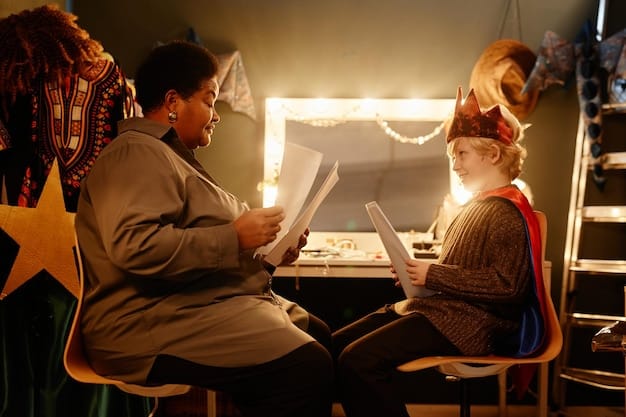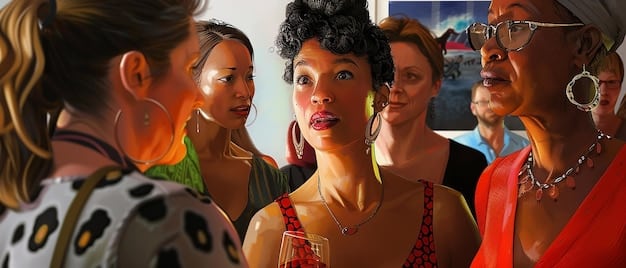The Evolving Role of Women in Brazilian Film: A 2025 Spoiler-Free Analysis

Spoiler-Free Guide: The Role of Women in Brazilian Film: A 2025 Analysis explores the increasing contributions of women as directors, writers, and actresses, shaping narratives and challenging traditional representations within the Brazilian film industry, promising a vibrant future.
Brazilian cinema is experiencing a dynamic shift, with women playing an increasingly pivotal role. This Spoiler-Free Guide: The Role of Women in Brazilian Film: A 2025 Analysis delves into the evolving landscape, celebrating their achievements and anticipating future contributions.
A Historical Overview of Women in Brazilian Cinema
The journey of women in Brazilian cinema has been one of gradual yet significant progress. Initially, women were largely confined to roles behind the scenes or as traditional representations on screen. Over time, they have broken through these barriers, asserting their presence and influence in various aspects of filmmaking.
Early Pioneers
The early days of Brazilian cinema saw few women in prominent roles. Those who did manage to enter the industry often faced significant challenges, including limited opportunities and societal expectations that favored men.
The Rise of Female Directors
As the industry evolved, so did the opportunities for women. The emergence of female directors marked a turning point, allowing for more diverse and nuanced storytelling.

Here are some crucial milestones:
- Emergence of female directors breaking traditional barriers.
- Increasing representation in film schools and production roles.
- Collaborative projects and initiatives supporting women filmmakers.
The historical context provides a foundation for understanding the current landscape and the future trajectory of women in Brazilian cinema.
Current Landscape: Female Voices Amplified
Today, the landscape of Brazilian cinema is markedly different. Women are not only present but are actively shaping the industry. Their voices are amplified through various avenues, leading to more inclusive and representative storytelling.
Breaking Stereotypes On-Screen
One of the most significant changes is the shift in on-screen representation. Women are no longer confined to stereotypical roles. Instead, they are portrayed as complex, multifaceted individuals with agency and depth.
Notable Female Directors and Their Impact
Several female directors have gained prominence, both nationally and internationally. Their films often tackle social issues, explore personal narratives, and offer unique perspectives on Brazilian society.
- Increased visibility for female-led projects at film festivals.
- Growing recognition of women’s contributions to Brazilian cinema.
- Mentorship programs and support systems for emerging filmmakers.
The current landscape is a testament to the resilience and talent of women in Brazilian cinema, showcasing their ability to captivate audiences and drive meaningful change.
Thematic Exploration: Stories Told Through a Female Lens
The stories told through a female lens offer unique perspectives on universal themes. These narratives often challenge conventional storytelling and provide a deeper understanding of human experiences.
Gender and Identity
Many female filmmakers explore themes of gender and identity in their work. They delve into the complexities of womanhood, challenging societal norms and expectations.
Social Issues and Advocacy
Brazilian female directors often use their platform to address social issues and advocate for change. Their films shed light on inequality, injustice, and other pressing concerns.

These stories often highlight:
- Exploration of identity and breaking gender norms.
- Narratives centered on female empowerment and resilience.
- Advocacy for social change and equality through storytelling.
The thematic exploration through a female lens enriches Brazilian cinema, offering audiences a more diverse and nuanced view of the world.
Challenges and Obstacles Faced by Women in Film
Despite the progress, women in Brazilian cinema still face challenges and obstacles. These hurdles range from systemic inequalities to cultural biases, hindering their ability to fully participate and thrive in the industry.
Gender Inequality in Funding and Distribution
One of the primary challenges is gender inequality in funding and distribution. Female-led projects often struggle to secure financial backing and gain access to wider audiences.
Overcoming Stereotypes and Bias
Women in film also encounter stereotypes and biases that limit their opportunities. They may be overlooked for certain roles or face skepticism about their abilities.
The industry needs more initiatives to address:
- Lack of access to funding and distribution channels.
- Stereotypes and biases affecting career advancement.
- Limited representation in decision-making positions.
Addressing these challenges is essential for creating a more equitable and inclusive environment in Brazilian cinema, allowing women to reach their full potential.
Looking Ahead: Projections for 2025
As we look ahead to 2025, the future of women in Brazilian cinema appears promising. With continued progress and support, their influence is expected to grow, leading to even more innovative and impactful storytelling.
Increased Representation and Recognition
By 2025, it is anticipated that there will be increased representation of women in all aspects of filmmaking. More female directors, writers, and producers are expected to emerge, gaining recognition for their talent and contributions.
Impact of Technology and Streaming Platforms
The rise of technology and streaming platforms is likely to play a significant role in the future of Brazilian cinema. These platforms offer new avenues for distribution and audience engagement, potentially leveling the playing field for female filmmakers.
Future projections include:
- Enhanced support systems and mentorship programs.
- Growing influence of streaming platforms on content creation.
- More diverse and inclusive storytelling opportunities.
The projections for 2025 paint a picture of a vibrant and inclusive Brazilian cinema, where women are at the forefront of innovation and creativity.
Supporting Women in Brazilian Film: What Can We Do?
Supporting women in Brazilian film requires a collective effort from industry professionals, policymakers, and audiences alike. There are various ways to contribute to a more equitable and inclusive environment.
Advocating for Policy Changes
Advocating for policy changes that promote gender equality is essential. This includes supporting legislation that ensures fair funding and distribution opportunities for female-led projects.
Promoting Female-Led Projects
Actively promoting female-led projects is another effective way to support women in Brazilian cinema. This can involve attending film festivals, spreading awareness on social media, and encouraging others to watch their films.
To actively support, we can focus on:
- Supporting initiatives promoting gender equality
- Watching and promoting films made by women.
- Raising awareness about the ongoing challenges.
By taking these steps, we can help create a more inclusive and supportive ecosystem for women in Brazilian film, ensuring their voices are heard and their stories are told.
| Key Point | Brief Description |
|---|---|
| 🎬 Historical Overview | Early struggles and gradual progress of women in Brazilian cinema. |
| 🌟 Current Landscape | Amplified female voices, breaking stereotypes, and notable directors. |
| 🎭 Thematic Exploration | Stories told through a female lens addressing gender and social issues. |
| 🔮 Projections for 2025 | Increased representation, technology impact, and diverse storytelling. |
Frequently Asked Questions
▼
Initially, women faced limited opportunities, societal expectations favoring men, and a lack of representation in key filmmaking roles. They were often confined to stereotypical or supporting roles.
▼
Several female directors have achieved prominence, creating impactful films that address social issues and explore personal narratives. These directors have garnered both national and international recognition for their work.
▼
Streaming platforms offer new avenues for distribution and audience engagement, potentially leveling the playing field for female filmmakers. These platforms provide opportunities for broader reach and diverse storytelling.
▼
Stories told through a female lens often explore themes of gender, identity, and social issues. These narratives challenge conventional storytelling and offer unique perspectives on human experiences and societal norms.
▼
Individuals can support by advocating for policy changes, promoting female-led projects, attending film festivals, spreading awareness on social media, and encouraging others to watch their films. Collective effort is key.
Conclusion
The role of women in Brazilian film is evolving dynamically. With increasing representation, impactful storytelling, and growing support, their influence is set to shape the industry’s future, offering diverse narratives and contributing to a more inclusive cinematic landscape.





